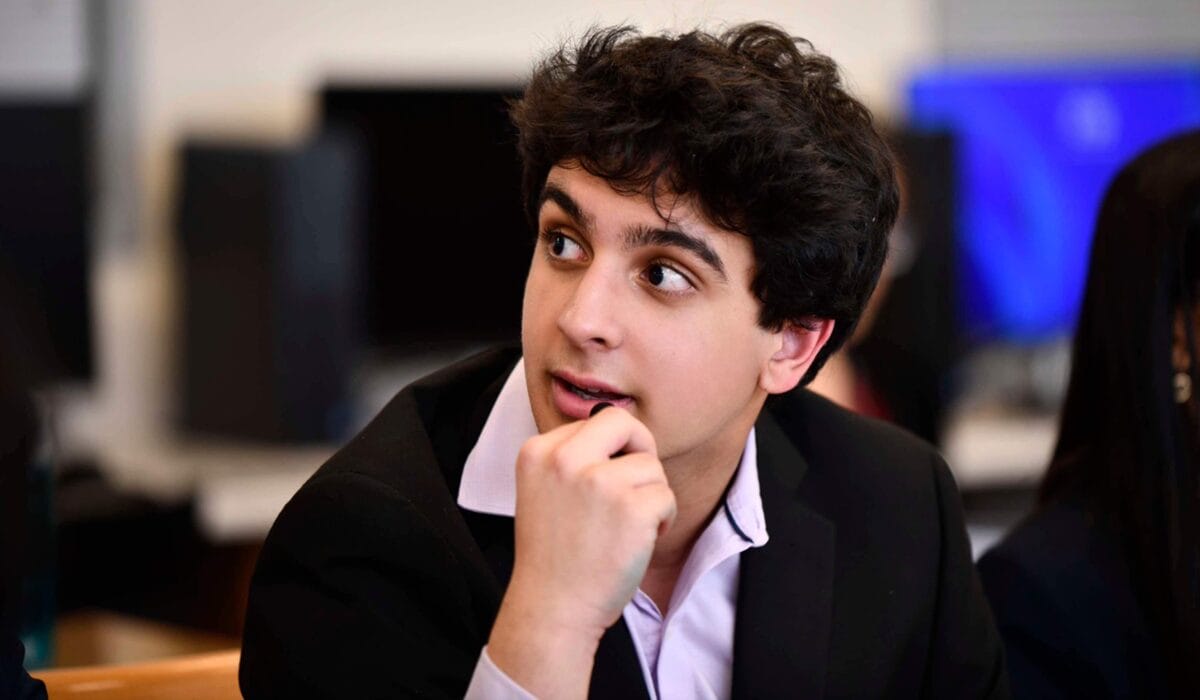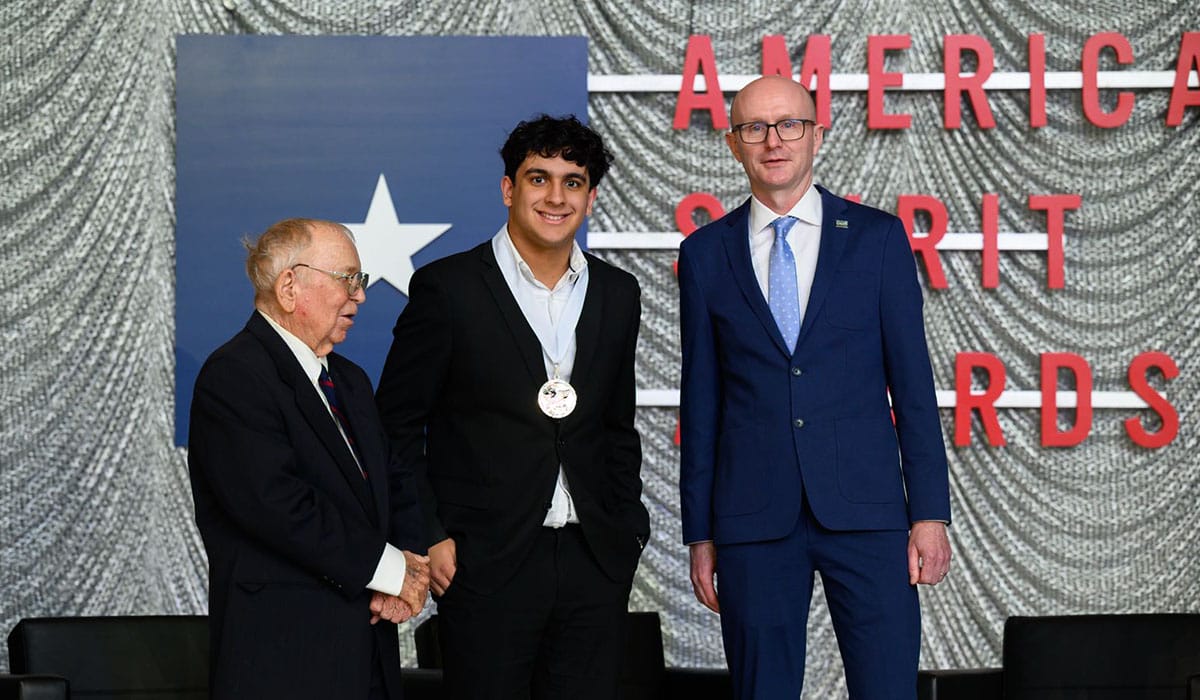Addressing Light Pollution and Its Health Impacts

Meet Daily Point of Light Award honoree Rushil Kukreja. Read his story, and nominate an outstanding volunteer or family as a Daily Point of Light.
On a clear night, are you able to step outside your home and see the stars? If not, you are probably living in an area with high light pollution, and it could be affecting your health as much as its affecting the local wildlife.
Two and a half years ago, Rushil Kukreja, now a 16-year-old high school senior, found out his aunt had breast cancer. With research, Rushil discovered that there is a 23% increase in risk of the disease in American nighttime workers–30-50% worldwide–due to light pollution. His aunt is a nurse who works long night shifts.
“It’s not something that’s really in the environmental conversation right now,” Rushil laments, adding that other topics, like climate change and air and water pollution, are often covered in school curriculums.
Light pollution, defined as excessive outdoor artificial light, also increases the risk of things like obesity, heart disease and diabetes. But humans aren’t the only ones suffering. Entire ecosystems can be disrupted.
“Light pollution causes the deaths of 600 million birds every year because of disorientation when they’re migrating as well as collision with lighted-up structures,” he highlights.
Talking to his peers, he recognized that when people understood the consequences, they wanted to engage in preventing them. Princia, Rushil decided, would fill in the gap. As founder and president of this student-run 501(c)(3) nonprofit, Rushil designs campaigns and awareness events, organizes research, onboards new members, manages social media strategy and builds partnerships. One of his biggest goals is to make light pollution part of the mainstream environmental conversation.
“We’re pursuing that through advocacy and education. We’re working with schools across the country and the world to incorporate light pollution curriculums,” he explains, pointing out the 750+ teachers involved across 300 schools. “The next step is actually making changes to people’s lifestyle. If people see an excessive light around town, or if they have extra lights turned on outside their home, they might try to get some of them turned off, and do the same at a commercial and government level.”
If education inspires individual action, congressional action inspires commercial movement. To assist, Rushil recruited Princia’s former director of government advocacy and friend from Model UN, Om Sharma, to create policy based on the scientific work he had done. Om led a team of interns in researching effective legislation across the country and the world. Then, collaborating with the science team, they drafted policies.

“We looked at things like what number of lumens or possible wattage could we put in a light bulb to limit the potential amounts of light pollution that would occur from that light,” Om recalls. “We also took a look at what hours we should turn off lights so that we aren’t disturbing natural ecosystems.”
Rushil took individualized results to lawmakers in eight different states as well as his own. In Virginia, he hopes to get a piece introduced and passed early next year, one of the first of its kind in the area.
At the same time, Rushil spoke at the United Nations General Assembly to raise awareness and advocate for international action. Many leaders approached him after his presentation to follow up on how to do more in their own countries.
“He’s incredibly personable and knowledgeable, so you can carry on a conversation with him,” Om states. “A lot of people may be turned off by how dealing with light pollution is so scientific. The fact that Rushil is able to connect with everyone on a personal level and is able to explain the situation to them, I think, is extraordinarily helpful.”
Om also lists Rushil’s ability to think on his feet and connect solutions the policy team was drafting to things that already exist as key to their success. The work is undoubtedly paying off. Already, Rushil has mobilized more than 250 volunteers in six different continents. Their work has shielded 1M+ lumens of light.
“No one else is going to fix these problems for us,” Rushil says. “Getting involved is how you build the kind of world that you actually want to live in.”
It’s also personally rewarding. But for Rushil, it’s not the big events that touch him the most.
“Some of my favorite moments are the smaller ones, where a volunteer tells me, for example, that they were able to shield all the street lights in their community, and they’re able to see the stars much better than before,” he smiles.
As a young person, Rushil was initially unsure if he could garner the kind of attention necessary for the collective action necessary to have an effect. Even climate change issues that have been plaguing the world for decades are sometimes met with doubt, pushback or indifference.
“I wasn’t sure if people would listen or believe me. But even young people, when you’re passionate and persistent, can make a change. You don’t need to wait to be an expert in order to take action,” he emphasizes. “If someone cares about an issue deeply, they should try to address it in any manner they can.”
Princia has garnered trust and grant money from several organizations. The Animal Welfare Institute gave $15,000 to further identify ways in which light pollution impacts wildlife. Cornell University is supporting the development of technology that took top prize at the Junior Science and Humanities Symposium.
“The Cornell grant is for another project we’re working on, which is a smart window that harvests solar energy and then uses it to help mitigate light pollution at night,” he details
Most of Princia’s research is being conducted by passionate high school volunteers—many of whom are collaborating with processors at local universities—and even middle schoolers. They’ve been inspired by the work Rushil continues to do towards building the world he wants to live in.
As Rushil applies to colleges, he is considering studying physics or astrophysics to help him do the same in his career. But in the meantime, he’s working on upgrading his driver’s permit, because everything he’s accomplished so far has been done before he’s been licensed to drive.
Do you want to make a difference in your community like Rushil? Find local volunteer opportunities.